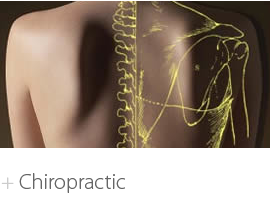
Naturopathy is an alternative medical system that focuses on natural remedies and the body's vital ability to heal and maintain itself. Naturopathic philosophy favors a holistic approach and minimal use of surgery and drugs. Naturopathy comprises many different treatment modalities of varying degrees of acceptance by the medical community; diet and lifestyle advice may be substantially similar to that offered by non-naturopaths.

Chiropractic is a health care discipline and profession that emphasizes diagnosis, treatment and prevention of mechanical disorders of the musculoskeletal system, especially the spine, under the hypothesis that these disorders affect general health via the nervous system. It is generally categorized as complementary and alternative medicine (CAM), a characterization that many chiropractors reject.

Herbalism is a traditional medicinal or folk medicine practice based on the use of plants and plant extracts. Herbalism is also known as botanical medicine, medical herbalism, herbal medicine, herbology, and phytotherapy. The scope of herbal medicine is sometimes extended to include fungal and bee products, as well as minerals, shells and certain animal parts. Pharmacognosy is the study of medicines derived from natural sources.

Traditional Chinese medicine, also known as TCM, includes a range of traditional medicine practices originating in China. Although well-accepted in the mainstream of medical care throughout East Asia, it is considered an alternative medical system in much of the Western world.

Meditation refers to any of a family of techniques that involve the self-induction of a mode of consciousness in order to realize some benefit. Meditation has been practiced since antiquity as a component of various religious traditions. Meditation is often associated with eremetic and monastic lifestyles.

Ayurveda or Ayurvedic medicine is a system of traditional medicine native to the Indian subcontinent and practiced in other parts of the world as a form of alternative medicine. In Sanskrit, the word ayurveda consists of the words āyus, meaning "longevity", and veda, meaning "related to knowledge" or "science"

Yoga refers to traditional physical and mental disciplines that originated in India. The word is associated with meditative practices in Hinduism, Buddhism and Jainism.Within Hinduism, it also refers to one of the six orthodox (āstika) schools of Hindu philosophy, and to the goal towards which that school directs its practices. In Jainism, yoga is the sum total of all activities — mental, verbal and physical.

Meditation refers to any of a family of techniques that involve the self-induction of a mode of consciousness in order to realize some benefit. Meditation has been practiced since antiquity as a component of various religious traditions. Meditation is often associated with eremetic and monastic lifestyles.

Hypnosis is a mental state or imaginative role-enactment It is usually induced by a procedure known as a hypnotic induction, which is commonly composed of a long series of preliminary instructions and suggestions. The use of hypnotism for therapeutic purposes is referred to as "hypnotherapy".

Homeopathy is a form of alternative medicine, first proposed by German physician Samuel Hahnemann in 1796, in which practitioners use highly diluted preparations. Based on an ipse dixit axiom formulated by Hahnemann, which he called the law of similars, preparations which cause certain symptoms in healthy individuals are given in diluted form to patients exhibiting similar symptoms

Acupuncture is the procedure of inserting and manipulating needles into various points on the body to relieve pain or for therapeutic purposes. The earliest written record of acupuncture is the Chinese text Shiji with elaboration of its history in the second century BCE medical text Huangdi Neijing. Different variations of acupuncture are practiced and taught throughout the world.

